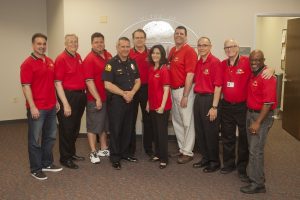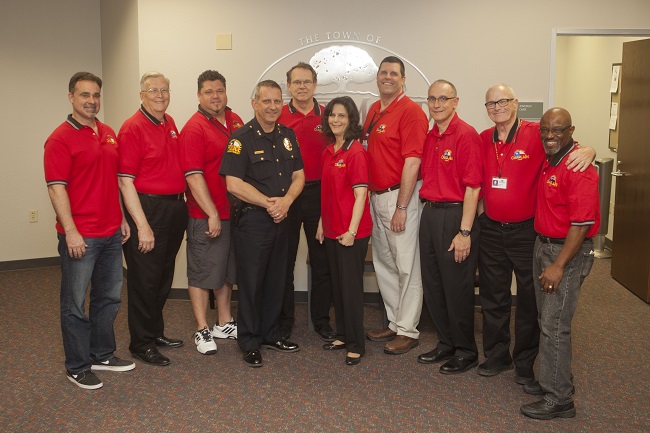
In times of trouble, a core group of people in Flower Mound take turns arriving at a scene of a crime or death or disaster to offer comfort to those in need.
Known as the Flower Mound Chaplain Corps, 14 individuals from local churches ranging from Kol Ami to RockPointe Church to New Life Fellowship and more make up the team. Pastors in Methodist churches or from the Baha’i faith also are part of the team that offers services, free of charge, whenever the need arises.
“It’s good to have someone there to assist families,” said Flower Mound Police Chief Andy Kancel. Having the chaplain corps is new to the police chief, who did not have those resources at prior departments he worked with. “I’m proud of our corps group. … They serve our community.”
A mission statement on the town’s website sums the purpose behind the chaplain corps:“We are pleased to introduce our community to the Town of Flower Mound Chaplain Corps. They are appointed by the Chief of Police and dedicated to providing a ministry of healing and comfort to the citizens, officers, firefighters and employees of the Town of Flower Mound. Coming from a variety of religious traditions and serving on a voluntary basis, the Flower Mound Police chaplains seek to sustain those in crisis, support those in need, and enhance the effectiveness of our town’s police, firefighters and other public servants.”
In a recent training session, members of the Chaplain Corps gathered to learn more about critical incident stress management from fellow corps member David Fredrickson. The training sessions are ongoing as the chaplain corps works to broaden their knowledge and skills to handle whatever may come their way.
Using his training in the U.S. Armed Forces, Fredrickson talked about the crucial aspect of being a chaplain: “That’s what we do – we share people’s pain.”
Studies have shown that an estimated 10 percent of people who face traumatic incidents develop post-traumatic stress syndrome or PTSD. And it is not only soldiers who suffer from it. First responders, such as police, fire and EMS personnel, can develop it as well as those exposed to trauma.
In a mass casualty situation, such as 9/11, up to 35 percent can develop PTSD, Fredrickson said.
Chaplains responding to a critical incident are charged with helping people process the incident. They set up a debriefing area to talk with individuals.
“What we’re doing is psychological triage,” he said. Using Maslow’s Hierarchy of Needs, chaplains assess first whether basic needs are being met – i.e. food, shelter and other physical needs. Once those are met, then work to help people process tragedies or trauma can begin.
Mike Liles of RockPointe Church says he enjoys being part of the chaplain corps because of the service it provides not only to Flower Mound police and fire but also to the community as a whole.
Liles, as the leader of a recent training session, talked about how the chaplain corps responds to everything from suicides to homicides to major accidents to provide counseling to those involved.
The chaplains arrive at each incident, assess the circumstances, alert the onsite incident commander of their presence, and make themselves available to those they identify as potentially in need.
Several chaplains even ride with patrol officers to get a feel of what they deal with and to become familiar with the situations to which they may be called upon to respond.
Fredrickson told the group of several strategies to help people stabilize themselves in times of trouble.
“The major therapy is to get them to talk about,” he said, adding it helps them process what they’ve just experienced.”




.jpg)


.png)








